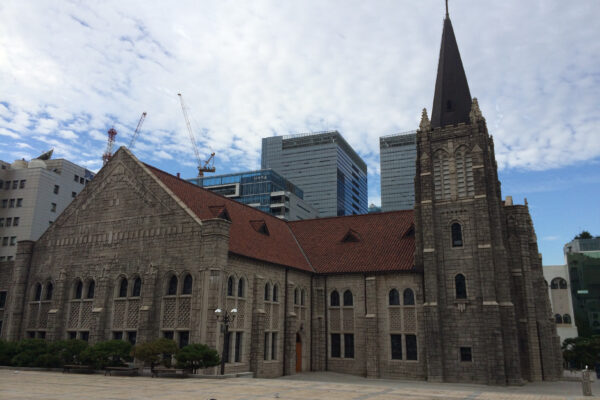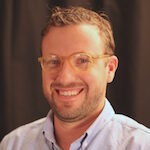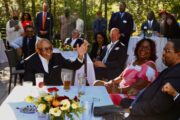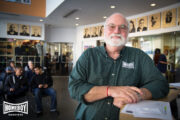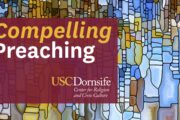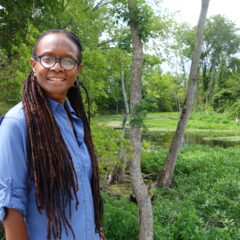Seoul, South Korea is the “Megachurch Capital of the World.” Not only is Seoul home to the largest known Protestant church in the universe, Yoido Full Gospel Church, the city has more residents who attend megachurches than any other city in the world. Runner-up Lagos, Nigeria has fewer than half of the 825,000 megachurch members in Seoul. But the rapid Protestant growth rates have transitioned to a slow decline, which in part have led to a dramatic rise in the number of Korean Catholics. One reason may be that Korean megachurch have forgotten their pasts.
“While in Rome, do as the Romans,” so while we were in Seoul last fall, we ate with metal chopsticks and took a tour of Young Nak Presbyterian Church located in the geographical heart of the city.
With 60,000 members, Young Nak is one of the largest churches in Korea and is one of the largest Presbyterian churches in the world. Kyung Chik Han, who died in 2000 and remains one of the most influential and respected figures in the history of Korean Christianity, founded the church. He is widely considered the “Billy Graham of South Korea.”
Young Nak’s stunning sanctuary and the enormous campus in one of Seoul’s most expensive neighborhoods stands as a far cry from its humble origins. Han started the church in 1945 with two dozen refugees from Soviet occupied North Korea. In the 1940’s and 50’s, Koreans living north of the 38th parallel flooded Seoul, arriving with not much more than the clothes on their backs. Han embraced the growing refugee community and built his church with the mission of serving the poor, widows and orphans. He sought out those living on the margins of South Korean society and used the church’s meager resources to set up shelters for war widows and orphans. As the church grew from a handful of North Korean refugees to thousands of members, they replaced their temporary tents with a bricks and mortar. As pastor of Young Nak, Han became a prominent figure in global Christianity. He helped to start World Vision and in 1992 Han won the Templeton Prize for his life’s work.
The final stop on our tour of Young Nak Presbyterian Church was a small museum erected in Han’s honor. One of the museum’s exhibits held all of the pastor’s worldly possessions upon his death: a winter hat, cane, glasses and a few books. The exhibit stood in stark contrast to the multi-million dollar megachurch that housed the museum. After his wife died and he retired, Han lived very simply in a cabin owned by the church. His choices to give away the million-dollar Templeton prize, not accumulate any personal wealth and not handoff Young Nak to his son were symbolic acts. Today Han’s meager possessions encased in a small glass case serve as his final three-point sermon to his fellow Korean Christians. Han’s posthumous message is simple. First, Christian leaders should be humble even if they win global awards. Second, pastors should not use their positions to accumulate personal wealth, and finally, the church is not a family business to be passed down like an inheritance to one’s children.
Han’s final sermon has proven to be a prophetic warning to Korean Protestant leaders. Sung-Gun Kim, professor of sociology at Seowon University, said that it explains, in part, why Protestant church growth is stagnant and Catholic Church membership is on the rise in South Korea.
“Scandals involving money laundering and squabbles over church succession have added to the damage. They have left the Protestant church in a state of weakness leaving the Catholic Church looking ‘more Christian’ by comparison, especially among younger professionals. Some ordinary Koreans, specifically young Buddhists, watching the scandals of the Protestant church, have found their way into the Catholic ranks. In addition to this, many Korean believers (especially Protestants in big cities) have migrated to the Catholic Church.”
The Catholic Church has doubled its share of the population, from 5 percent of all South Koreans in the 1980’s to 11 percent of the country.
The Protestant church is facing difficulty in South Korea for some of the same reasons the Catholic Church is currently in crisis in Europe, the United States and Latin America. The lesson I took away from our trip to Seoul is that for religious groups, integrity matters. If Protestant leaders want to stem the tide of decreasing membership in South Korea their number one priority should be restoring the integrity of the church. The legacy of Pastor Kyung Chik Han may provide an idea of how to start.
A photo posted by USC Religion & Civic Culture (@usccrcc) on
Andrew Johnson is a contributing fellow with the USC Center for Religion and Civic Culture.
